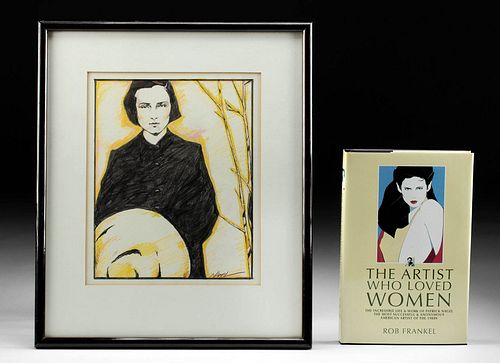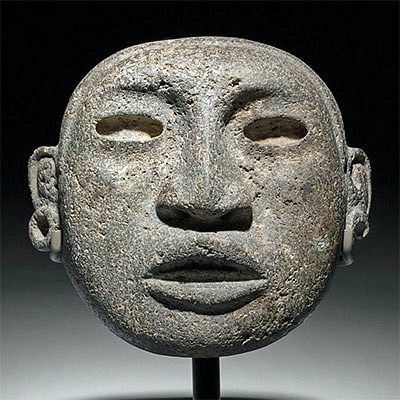60's Patrick Nagel Portrait of Rhea Nagel + Signed Bio
Lot 265
About Seller
Artemis Gallery
686 S Taylor Ave, Ste 106
Louisville, CO 80027
United States
Selling antiquities, ancient and ethnographic art online since 1993, Artemis Gallery specializes in Classical Antiquities (Egyptian, Greek, Roman, Near Eastern), Asian, Pre-Columbian, African / Tribal / Oceanographic art. Our extensive inventory includes pottery, stone, metal, wood, glass and textil...Read more
Categories
Estimate:
$19,000 - $38,000
Absentee vs Live bid
Two ways to bid:
- Leave a max absentee bid and the platform will bid on your behalf up to your maximum bid during the live auction.
- Bid live during the auction and your bids will be submitted real-time to the auctioneer.
Bid Increments
| Price | Bid Increment |
|---|---|
| $0 | $25 |
| $300 | $50 |
| $1,000 | $100 |
| $2,000 | $250 |
| $5,000 | $500 |
| $10,000 | $1,000 |
| $20,000 | $2,500 |
| $50,000 | $5,000 |
| $100,000 | $10,000 |
| $200,000 | $20,000 |
About Auction
By Artemis Gallery
Mar 24, 2022
Set Reminder
2022-03-24 10:00:00
2022-03-24 10:00:00
America/New_York
Bidsquare
Bidsquare : Exceptional Antiquities Ethnographic Fine Art
https://www.bidsquare.com/auctions/artemis-gallery/exceptional-antiquities-ethnographic-fine-art-9057
Museum-worthy examples of classical antiquities (Egyptian, Greek, Roman, Near Eastern), Viking, Far East / Asian, Pre-Columbian, African / Tribal, Oceanic, Native American, Spanish Colonial, Fossils, Ancient Jewelry, Fine / Visual Arts, so much more! Artemis Gallery info@artemisgallery.com
Museum-worthy examples of classical antiquities (Egyptian, Greek, Roman, Near Eastern), Viking, Far East / Asian, Pre-Columbian, African / Tribal, Oceanic, Native American, Spanish Colonial, Fossils, Ancient Jewelry, Fine / Visual Arts, so much more! Artemis Gallery info@artemisgallery.com
- Lot Description
Patrick Nagel (American, 1945-1984). Portrait of Rhea Nagel, the artist's mother, ca. 1967-1969. Mixed media: ink and colored pencil on illustration board. Signed by the artist on the lower right corner. A rare and early portrait by Patrick Nagel, presenting a half-length view of his mother, Rhea, dressed in a black coat with pink buttons and holding a wide-brimmed yellow hat. Only two bare tree branches grace the stark background. One can see the artist's signature minimalist style begin to emerge in this piece. Note the lack of coloring in the face and the unique stylization of the eyes - both would become hallmark characteristics of Nagel's style. This high-contrast piece exemplifies Nagel's early works. Nagel's experience as a mapmaker for the US Army during the Vietnam War (1966) "forced him to illustrate with no colors, setting him on a course of increasing minimalism for the rest of his life." A fascinating piece by Nagel, best known for his "Nagel Women" rendered in a bold style iconic of the 1980s. Size of image: 9.125" L x 7.125" W (23.2 cm x 18.1 cm) Size of frame: 14.7" L x 12.375" W (37.3 cm x 31.4 cm)
Rob Frankel - author of Patrick Nagel's biography "The Artist Who Loved Women" (2016) - discussed the importance of Nagel's mother to his oeuvre, "Although his later work became world-renowned for 'the Nagel Woman,' Patrick Nagel's attitudes and portrayals of women were deeply rooted in his perception and relationship with his mother, Rhea, who was a strong, forceful personality. She possessed a lot of the characteristics that defined 'the Nagel woman' throughout Pat's career, which explains why Nagel's women are always beautiful and sensual – but never warm, loving or remotely maternal. In fact, Nagel himself is known to have spoken about the women in his works as those who 'he’d rather not meet.' To be sure, the soft-spoken Nagel harbored conflicts about women, love and the integration of the two."
Patrick Nagel was born in Dayton, Ohio and raised in the Los Angeles area. Following his service in the US Army during the Vietnam War, he attended the Chouinard Art Institute (1969) and received his BFA from California State University, Fullerton. His bold and colorful depictions of the so-called Nagel women appeared in Playboy magazine as well as record album covers - the most famous being the cover of Duran Duran's "Rio" - and of course his large-scale posters that were coveted my countless admirers during the 1980s.
Many have mused over the artistic influences on Patrick Nagel's work, among them Art Deco, Pop Art, and Japanese woodblock prints. For example, Elena G. Millie, curator of the poster collection at the Library of Congress, eloquently stated, "Like some of the old print masters (Toulouse-Lautrec and Bonnard, for example), Nagel was influenced by the Japanese woodblock print, with figures silhouetted against a neutral background, with strong areas of black and white, and with bold line and unusual angles of view. He handled colors with rare originality and freedom; he forced perspective from flat, two-dimensional images; and he kept simplifying, working to get more across with fewer elements. His simple and precise imagery is also reminiscent of the art-deco style of the 1920s and 1930s - its sharp linear treatment, geometric simplicity, and stylization of form yield images that are formal yet decorative."
This piece comes to us from the private collection of Rob Frankel - author of Patrick Nagel's biography "The Artist Who Loved Women" (2016). Frankel has authenticated this piece based on various details such as the signature, which matches that of other Nagel works from the period, the likeness of the subject (Patrick Nagel's mother, Rhea), the rendering of her eyes, and the lack of pigment in the face. These last two attributes emerged in Nagel's art during this time and would persist throughout the rest of his career. In addition, according to Frankel, there are only two other portraits known to survive from this early period of Nagel's oeuvre - one of his mother (Rhea) and the other of his father (Bud), both of which remain with private collectors and were published in "The Artist Who Loved Women"; a signed copy of Frankel's "The Artist Who Loved Women" (2016) accompanies this piece.
Just last year, Patrick Nagel's "Study for Untitled" (ca. 1980) comprised of ink hammered for $35,000 at Christie's (October 1, 2021 - lot #210). The portrait of Rhea Nagel featured in today's lot is arguable rarer, being among the earliest known portraits by Nagel, depicting his mother, and demonstrating the emergence of his signature style.
Provenance: Private Rob Frankel collection of Valley Village, California, USA
All items legal to buy/sell under U.S. Statute covering cultural patrimony Code 2600, CHAPTER 14, and are guaranteed to be as described or your money back.
A Certificate of Authenticity will accompany all winning bids.
PLEASE NOTE: Due to recent increases of shipments being seized by Australian & German customs (even for items with pre-UNESCO provenance), we will no longer ship most antiquities and ancient Chinese art to Australia & Germany. For categories of items that are acceptable to ship to Australia or Germany, please contact us directly or work with your local customs brokerage firm.
Display stands not described as included/custom in the item description are for photography purposes only and will not be included with the item upon shipping.
#169932The portrait has not been examined outside the frame but appears to be excellent overall. It is hand signed by the artist on the lower right. This signature has been authenticated by Rob Frankel, author of Nagel's biography "The Artist Who Loved Women" (2016). The frame has a few minor scuffs, but is otherwise very nice. Minor tears to gallery paper on verso that do not impact the artwork. There is suspension hardware on verso, and this piece is ready to display. The accompanying copy of "The Artist Who Loved Women" is signed by the author, Rob Frankel, and it is in excellent condition.Condition
- Shipping Info
-
All shipping is handled in-house for your convenience. Your invoice from Artemis Gallery will include shipping calculation instructions. If in doubt, please inquire BEFORE bidding for estimated shipping costs for individual items.
-
- Buyer's Premium



 EUR
EUR CAD
CAD AUD
AUD GBP
GBP MXN
MXN HKD
HKD CNY
CNY MYR
MYR SEK
SEK SGD
SGD CHF
CHF THB
THB














